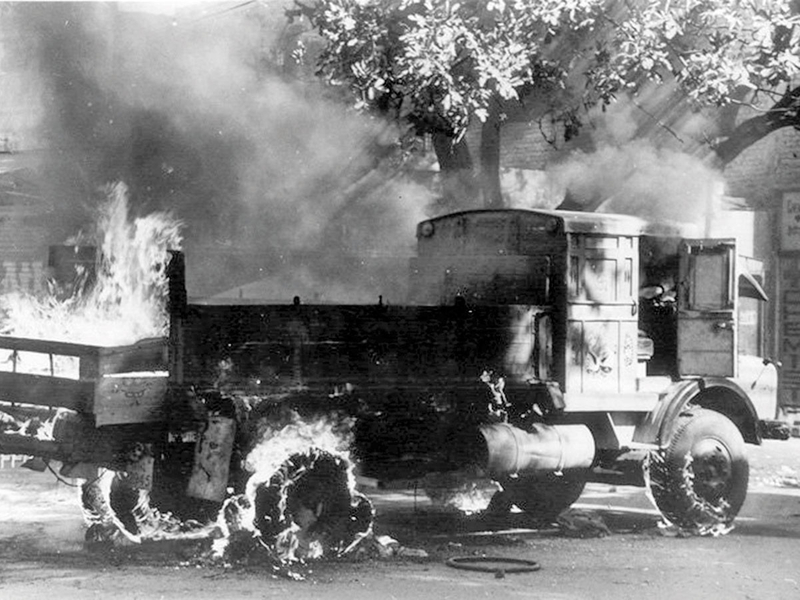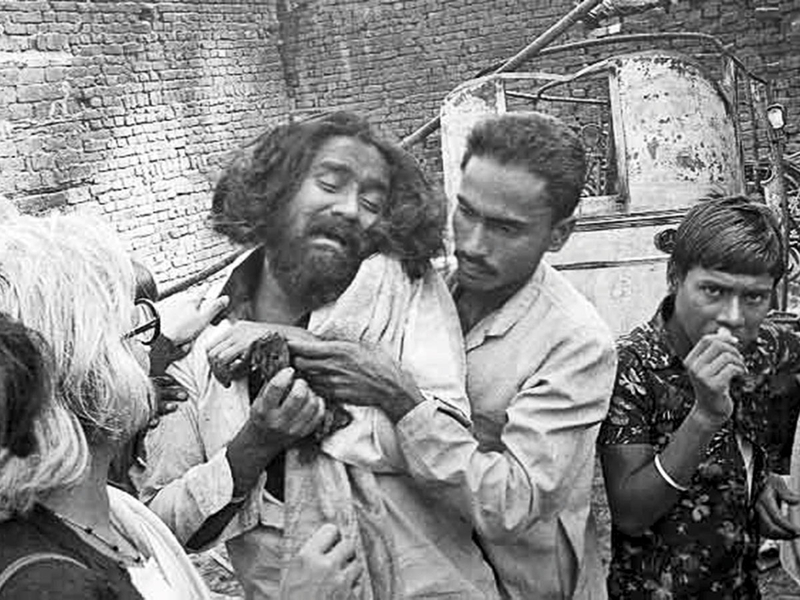Multiculturalism in Canada
"There are going to be repercussions [if the bill passes]."
"At this point, we should talk about building relations with this country, we should talk about the trade."
"Something that happened 35, 36 years ago ... that has no relevance."
Anil Shah, New Delhi Canada India Foundation
"...I fail to sympathize with the priority that some leaders of the [Sikh] community in Canada -- not all -- give to labelling their suffering and victimization as genocide."
Dr.Frank Chalk, history professor, Concordia University
_resources1_16a08521e2d_medium.jpg) |
| Sikh shops and establishments were targeted and burnt in Delhi during anti sikh riots in 1984. Image Credit: AFP |
As past president of the International Association of Genocide Scholars, Dr.Chalk does come from a position of objective perspective. Genocide is a word that is far too loosely bandied about lately. It has a clear enough definition; a deliberate plan to annihilate a distinct group of people of ethnic or national origins. And here we speak of millions of people exterminated as in the Holocaust or the Armenian mass murder by the Ottoman Turks; the swift slaughter of the Tutsi by the Hutu tribe in Rwanda another case in point.
Relations between Indian Sikhs who yearn for a homeland of their own that they call 'Khalistan', and India is tense and fraught with incipient violence, occasionally breaking out in incidents of Hindu-versus-Sikh nationalists. Canada suffered its first dreadful terrorism act in a deliberate bombing of Air India Flight 182 in 1985, an act of sabotage by Canadian Sikhs that caused the death of 307 passengers and 22 crew, the majority Indo-Canadians. Hostility between Sikhs and Hindus have simmered for years.
But they came to a head when Sikh bodyguards assassinated then-Prime Minister Indira Gandhi in 1984, furious to avenge the storming by Indian troops of the sacred Golden Temple of Amritsar where Sikh separatist militias were taking cover. The assassination resulted in a wave of pogroms where up to 3,000 Sikhs were killed by Hindus on a murderous rampage responding to the killing of Indira Gandhi. Her Congress Party was blamed for inciting the rioters. And while one death by a murderous mob is too many, 3,000 do not constitute a genocide.
 |
| Sikh property was systematically identified and destroyed. Image Credit: AP |
And nor should it be expected by any expatriate ethnic group that has settled in Canada -- and many have, from all over the world, many arriving as refugees escaping from dreadful persecution by their own state -- that a memorial day be set aside to highlight their special grievance, as legitimate as the grievance itself may be. It was left behind and the raging hatred should be left there as well, and not consume the community that re-establishes itself in Canada to be part of the Canadian identity.
But that was not the intention of an Ontario Member of the Provincial Parliament whose purpose it was to persuade the Ontario legislature to assign a special day of commemoration for the thousands of Sikhs that were killed in New Delhi and elsewhere in India. Understandably, New Delhi and the current Prime Minister, Narendra Modi, is anything but pleased at the prospect of this vestige of irreconcilable cultural-heritage/religious difference within his population becoming symbolic within Canada of Indian Hindu nationalistic fanaticism.
As large as the Sikh community in Canada is, it is counter-balanced by a larger East Indian Hindu component. Comprising 3.9% of the Canadian population, there are approximately, 1,400,000 Indo-Canadians, of whom a half-million are Sikh. As Canadians it is in everyone's best interest that they live together as Canadians, allowing their enmities to remain back in India if their differences cannot be resolved.
Yet Sikh organizations have been working to rally the current Government of Ontario to support legislation to crate a "Sikh genocide week" in memory of the 1984 riots following Indira Gandhi's murder. There is a good chance the bill could pass in the legislature, in the process alienating Hindu-Canadians, along with the government of India which already looks askance at the seeming sympathies of the federal government of a politically-active Sikh-Canadian population in vote-rich Ontario.
According to history professor Frank Chalk, as loathsomely horrible as the attacks were they fail to meet internationally accepted definition of the term, genocide. This, despite New Democrat Gurratan Singh's determination to see the legislation pass after he introduced the bill last month, claiming cries for justice among the Sikh community should be heard: "The trauma of this genocide is real and still impacts Sikhs that call Ontario home", he insisted.
And then there is the reasonable voice of Anil Shah who agreed the killings were reprehensible acts of revenge, but they were not government-perpetrated genocide. There is an unfortunate precedent when in 2017 the Ontario legislature passed a motion instigated by a a member describing the events that took place in New Delhi as a genocide which India took to illustrate that Ontario favoured the Khalistani separatist movement, which led to a distancing between the two countries diplomatically.
 |
| Relatives grieve at a funeral after the sikh riots in Delhi. Over three days in Nov 1984, 350 Sikhs had lost their lives here. Image Credit: AFP |
Labels: Crisis Management, Hindus, India, Indo-Canadians, Khalistan, Sikhs
0 Comments:
Post a Comment
<< Home